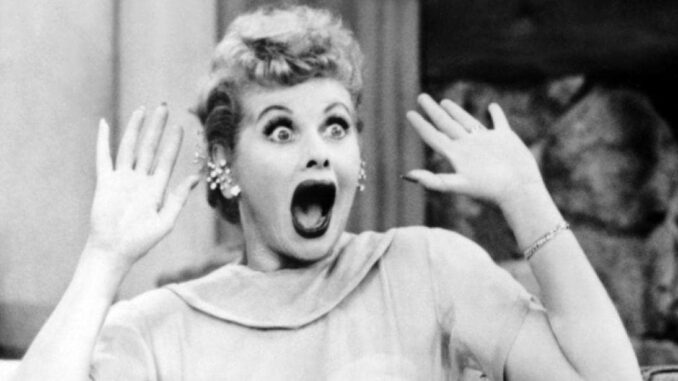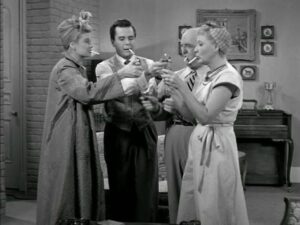
Introduction
When you think of I Love Lucy, you probably picture the hilarious antics of Lucy Ricardo and her unwavering charm. But behind the laughter and lighthearted episodes lay a world of tension, secrets, and struggles that few fans ever realized. The groundbreaking sitcom, which defined a generation, had its fair share of behind-the-scenes drama that could rival any soap opera. Curious to uncover what really happened when the cameras stopped rolling? Let’s dive into the surprisingly dark secrets behind one of television’s most beloved shows.
The Show That Changed Television Forever
Before we delve into the darker side, it’s essential to understand the monumental impact of I Love Lucy. Premiering in 1951, the sitcom broke barriers, from being the first show to feature an interracial couple to pioneering the use of a three-camera setup. But as groundbreaking as it was, the pressures of innovation came at a cost.
The Real-Life Tensions Between Lucy and Desi
Lucy and Desi’s Picture-Perfect Marriage Wasn’t So Perfect
On-screen, Lucy and Ricky Ricardo’s relationship was full of comedic misunderstandings and love. Off-screen, however, Lucille Ball and Desi Arnaz’s marriage was far from idyllic. Desi’s infidelity and heavy drinking created a rift that even their undeniable chemistry couldn’t mend. Despite their public image as a power couple, their relationship was plagued with mistrust and arguments.
Divorce Loomed During Filming
While the couple managed to keep their marriage intact during the show’s run, their personal struggles were no secret to the cast and crew. The tension often spilled over onto the set, creating an atmosphere that was anything but harmonious.
Lucille Ball’s Secret Struggles
The Pressure of Perfection
Lucille Ball wasn’t just the star of I Love Lucy—she was its backbone. Her comedic timing and physical humor set the gold standard for sitcoms. However, this perfection came at a cost. Ball was a notorious perfectionist, often demanding retakes until every scene met her high standards. This relentless pursuit of excellence left her exhausted and stressed.
A Red Scare Scandal
In the 1950s, the fear of communism swept through Hollywood, and Lucille Ball wasn’t spared. When it was revealed that she had registered as a communist in the 1930s (a decision she later attributed to appeasing her grandfather), it caused a media frenzy. Though she was cleared of any wrongdoing, the scandal added immense stress to her already demanding life.

Desi Arnaz: A Complicated Genius
The Man Behind the Innovation
Desi Arnaz wasn’t just a co-star; he was a visionary. He played a pivotal role in creating the show’s innovative production techniques, including the three-camera setup and live audience filming. Yet, his brilliance was often overshadowed by his personal demons.
Battling Addiction
Desi’s struggles with alcoholism were well-documented. His drinking often caused delays on set and contributed to the strain in his marriage with Lucille. Despite these issues, his contributions to the show’s success remain undeniable.
Feuds Among Cast Members
Vivian Vance and William Frawley’s Icy Relationship
While Ethel and Fred Mertz appeared to be a lovable, bickering couple on-screen, the actors who played them—Vivian Vance and William Frawley—couldn’t stand each other. Their mutual disdain was so intense that they barely spoke outside of filming. Frawley, much older than Vance, resented her complaints about their age difference, while Vance found him unprofessional.
The Strain Between Lucy and Vivian
Though Lucy and Vivian Vance had a close working relationship, rumors of jealousy occasionally surfaced. Vance reportedly felt overshadowed by Ball’s stardom, leading to occasional friction.
The Grueling Production Schedule
Long Hours and High Expectations
Filming I Love Lucy was no easy feat. With Lucille Ball’s perfectionism and the show’s high standards, the cast often worked long hours. The grueling schedule took a toll on everyone involved, contributing to the tension on set.
Physical Comedy Came at a Cost
Lucille Ball’s dedication to physical comedy wasn’t without consequences. She often performed her own stunts, leading to injuries that she powered through to keep the show on track.
The Show’s Legacy Came With a Price
Breaking Up the Band
By the end of the show’s run in 1957, the personal and professional pressures had taken their toll. Ball and Arnaz divorced shortly after the series ended, marking the end of an era for the iconic duo.
The Emotional Fallout
The end of I Love Lucy left a void in the lives of its cast members. For Lucille Ball, the show’s conclusion was bittersweet—it marked the end of a successful chapter but also a painful personal loss.
Conclusion
While I Love Lucy brought joy to millions, the behind-the-scenes reality was far from idyllic. From marital strife to grueling work conditions, the show’s success came at a significant cost. Yet, despite the challenges, the cast and crew created a timeless classic that continues to inspire and entertain audiences to this day. The laughter may have masked the struggles, but the legacy of I Love Lucy remains unshakable—a testament to the resilience and talent of those who brought it to life.
FAQs
1. Did Lucille Ball and Desi Arnaz get along during the show?
While they maintained a professional relationship on set, their marriage was fraught with personal challenges, including infidelity and arguments.
2. Why did Vivian Vance and William Frawley dislike each other?
Their age difference and clashing personalities led to a contentious relationship off-screen, despite their on-screen chemistry.
3. What was the Red Scare scandal involving Lucille Ball?
Lucille Ball faced scrutiny for registering as a communist in the 1930s, though she was cleared of any wrongdoing during the height of McCarthyism.
4. How did Desi Arnaz contribute to television innovation?
Desi Arnaz pioneered the three-camera setup and live audience filming, revolutionizing the way sitcoms were produced.
5. What made I Love Lucy so iconic?
The show’s groundbreaking humor, relatable characters, and innovative production techniques set the standard for sitcoms and solidified its place in television history.
